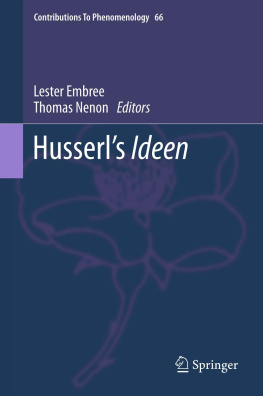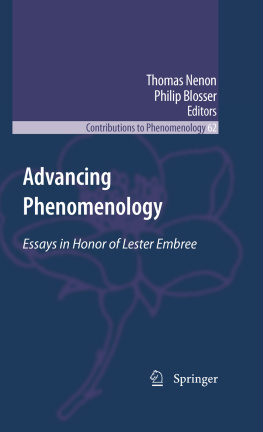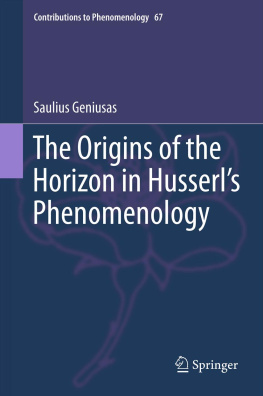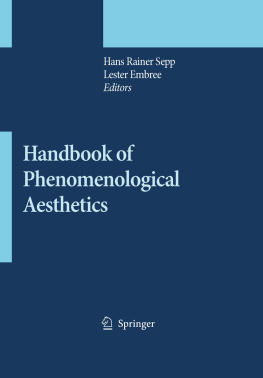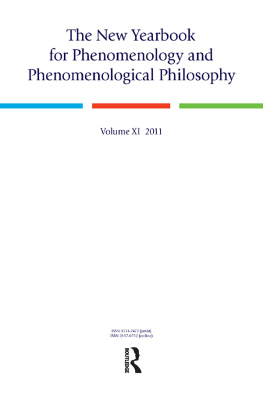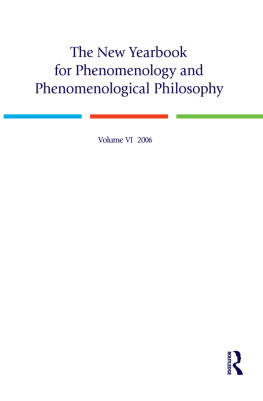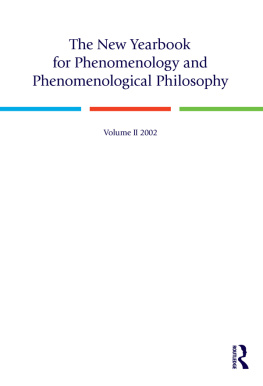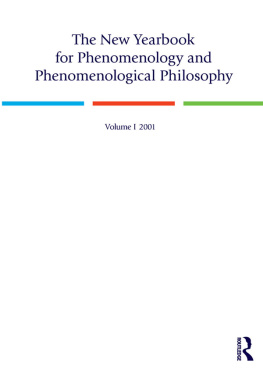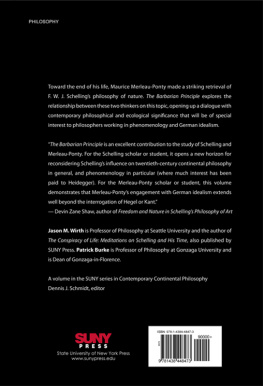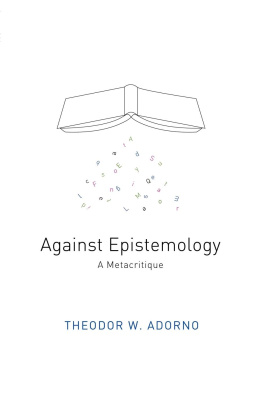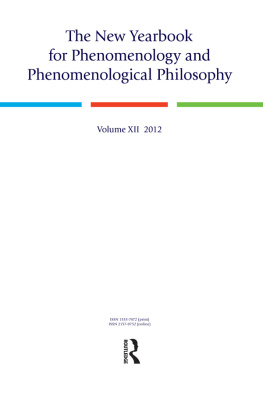Lester Embree and Thomas Nenon (eds.) Contributions to Phenomenology Husserls Ideen 2013 10.1007/978-94-007-5213-9_1 Springer Science+Business Media Dordrecht 2013
1. Jos Ortega y Gasset and Human Rights
I thank Gema Rodrguez Trigo for her support during the preparation of this chapter. I should also like to express gratitude to Javier San Martn and, especially, to Jorge Brioso. Their suggestions and commentaries helped me to improve the essay. This text was elaborated as a part of a research project sponsored by the Spanish Department of Investigation, Science and Innovation (FI2009-11707).
The Influence of Husserl
Jos Ortega y Gassets relations with Husserlian phenomenology are intense and problematical, intense because, as recent studies have shown, it is impossible to understand the very heart of Ortegas philosophy if we do not understand the profound influence of the author of Ideen I ,
This incipient abandonment of Husserls thinking and its interpretation in an idealist code were the two hermeneutic theses that the majority of Ortegas closest and most influential disciples accepted uncritically and perpetuated as dogma until recently. This is not easy to abandon. Had not Ortega sanctioned this position on Husserl? Who could better narrate this history? Taking into account this situation, it is not surprising that most histories of philosophy and collections of readings do not link Ortega with the author of Ideen .
Within the Anglo-American world, Ortega is generally situated within Existentialism without almost any connection with phenomenology. And if this public is a Hispanic one, the situation is even worst, at least until recently. The reason is that the majority of Ortegas disciples not only faithfully followed the masters self-interpretation concerning Husserls phenomenology, but extended it to practically all other philosophical tendencies of the time. This way of reading Ortega ends up saying that the theory of historical reason cannot be linked, strictly speaking, to phenomenology in general or to any other philosophical tendency. The result was a consolidation of what a perceptive specialist, Pedro Cerezo, has called venerational hermeneutics .
But this assumption of originality has weighed heavily. Without the links with the philosophy of his time, Ortegas work is uninteresting for anyone who is not a specialist in his work. If it is so original and peculiar, why should someone who studies phenomenology, hermeneutics, or pragmatism be interested in his thinking?
But the most recent studies have shown the untruthfulness of Ortegas self-interpretation. He did not abandon phenomenology at the very moment he received it. Nor did he always understand Husserls thinking as the last and most sublime form of modern idealism. It is true that in 1929 Ortega began to read Husserl in this way. But before this date he accepts many of his phenomenological theses as precisely the ones that most helped idealism to collapse. In between, there is the reading of Sein und Zeit (1927).
Let me describe Ortegas relationship with Husserls phenomenology. First, I will discuss Ortegas acceptance of his phenomenology up until 1929. Then I will focus on his later criticisms of epoch and transcendental reduction.
In 1913 Ortega gave two lectures, On the Concept of Sensation and Sensation, Construction, and Intuition, which are the first two texts in phenomenology written in Spanish. These were for an audience not specialized in the new philosophy. Both reflect considerable knowledge of the Logische Untersuchungen and, especially in the first one, Ideen I . Ortegas interest in phenomenology is also evident in references to Theodor Conrad and Heinrich Hoffmann.
In 1915 and 1916, Ortega gave two university courses where Husserlian phenomenology is central. Sistema de la Psicologa , held in Madrid, is an explanation and a personal acceptance of some key concepts: natural attitude, intentionality, intuition, psychologism, evidence, epoch , reduction, essence, world/horizon. Introduccin a los problemas actuales de la filosofa , held in Buenos Aires, But what is it about phenomenology that captivates Ortega? To answer this question, it is necessary to consider his critique of idealism.
Trained in the neo-Kantianism of Cohen and Natorp, Ortega begins to mistrust this philosophy in 1911 during his second stay in Marburg. The problem with idealismnot only in its neo-Kantian versionis its lack of radicalness. For Ortega, philosophy must be, la Husserl, a science with no presuppositions, a peculiar kind of theory whose final mission is to reveal to us radical reality , the ultimate foundation upon which rests our very existence, and the existence of everything. Idealism postulates that this reality is consciousness. However, Ortega considers idealistic consciousness a hypothesis , an assumption , a failed attempt to clarify the rocky ground of what is radically real. Edmund Husserls new philosophy will show this. Let us look at this briefly.
According to the Spanish philosopher, there are two great conceptions of the ultimate foundation in the history of thought. In realism, the world is an independent reality that provides the reason for everything that exists. This is Ancient and Medieval philosophy. Subjectivity passively registers the reality of a world that exists completely independently of it. A proper metaphor is the wax tablet upon which the letters of the world are written. But starting in the Renaissance, the insufficiencies of this thesis begin to appear. This real world faithfully registered by a subject that is also real and like a wax tablet can be doubted. Our senses deceive us frequently. And we cannot talk about the existence of something without thinking about it. Saying that something is is equivalent to saying that I somehow have it in my thought, broadly speaking. The Modern Age corrects the carelessness of ancient times, which did not acknowledge that everything that attempts to exist must be an object for me, that is, it must enter into the report of consciousness. The Moderns move radical reality from the world to consciousness. As Berkeley said, esse id est, percipi . The new metaphor is that of a recipient that contains everything that there is the way a vessel contains its contents. Objects, in general, then, become contents of consciousness . Everything becomes content of my mind, a representation in my consciousness. Consciousness is what now enjoys and stipulates true reality.

